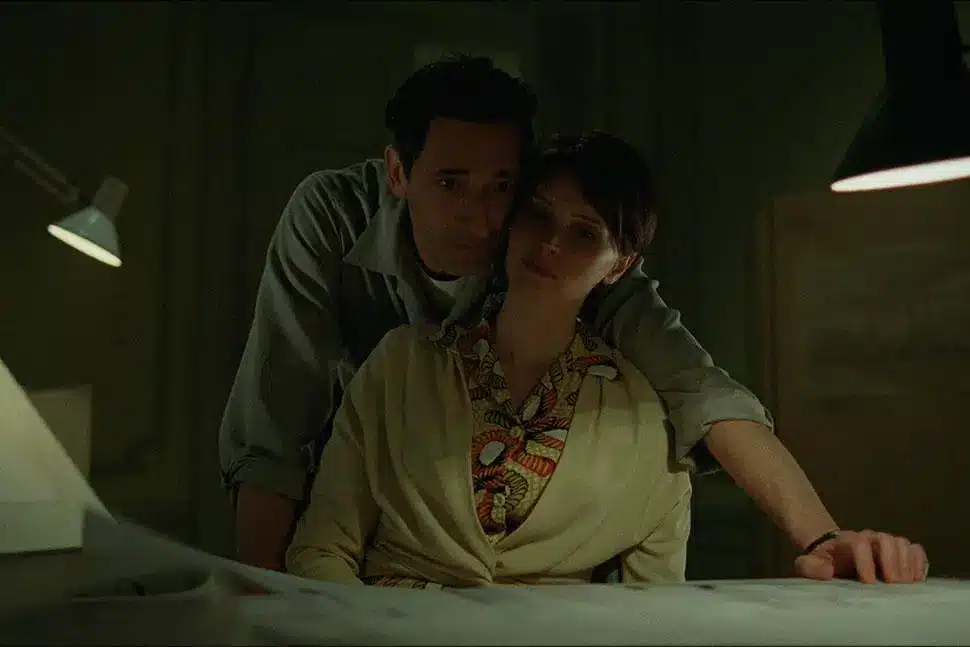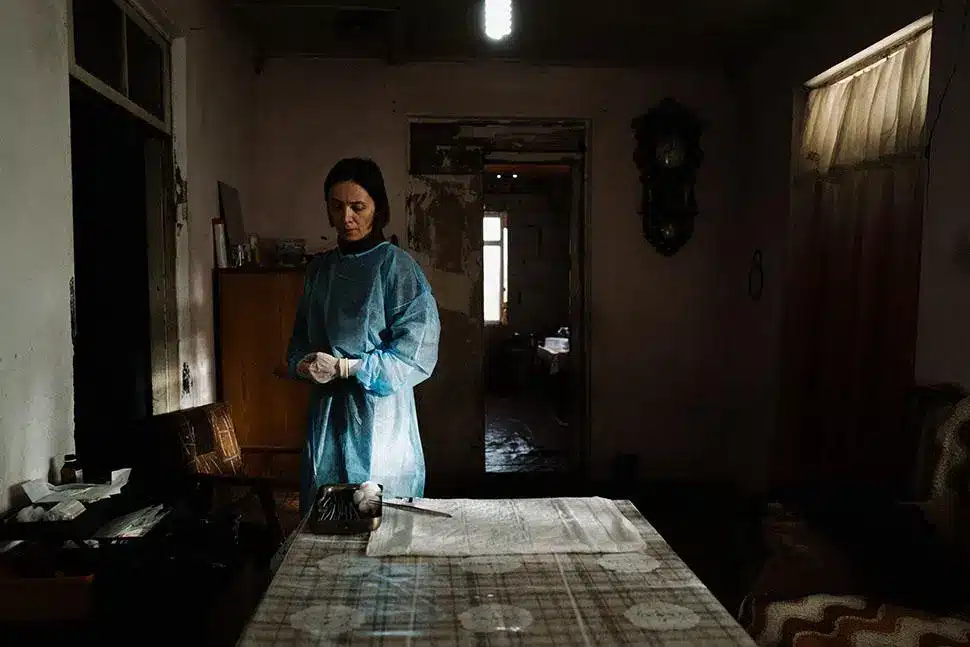
Rafa Sales Ross rounds up the 2024 festival, where boiling temperatures were met with steamy films, Gaga fever and a masterpiece from Brady Corbet in The Brutalist.
The 2024 Venice Film Festival felt as if it was about to erupt. Literally, as temperatures reached the mid-30s and sweat-drenched festival goers resorted to looking for shade under sponsored banners and corner shop umbrellas; but also metaphorically, with films like Halina Reijn’s Babygirl and Luca Guadagnino’s Queer allowing established names like Nicole Kidman and Daniel Craig to push the boundaries of on-screen pleasure while also ushering in a new generation of screen stars in Harris Dickinson and Drew Starkey.
In Babygirl, Nicole Kidman’s titular turn as a highly successful, very much married CEO who falls in lust with a magnetic new intern (Dickinson) with a penchant for S&M got the actress the coveted Volpi Cup for Best Actress, with main competition jury president Isabelle Huppert—one of the boldest actresses to ever do it—labelling her performance in the film “daring.” Reijn’s sizzling ode to the classic 1990s erotic thriller was one of the early hits of this year’s festival, with Kidman’s central performance earning comparisons to her work in seminal films such as Stanley Kubrick’s Eyes Wide Shut and Jonathan Glazer’s Birth.
If Babygirl brought the heat to Venice with a refreshing look at sexual dynamics spanning class, gender and generations, Spanish auteur Pedro Almodóvar finally won the main prize at one of the big three European festivals (Berlin, Cannes, and Venice) for the surprisingly tame The Room Next Door. The Tilda Swinton/Julianne Moore two-hander is Almodóvarian in essence, with gorgeous shades of red and green permeating each frame, but lacks the director’s signature transgression, with this tale of a woman fighting for her right to die as she pleases bypassing Almodóvar’s penchant for layered portrayals of human desire. Plus, in one of those ironic twists far too frequent at festival awards, it took Almodóvar making his first-ever English-language feature to be recognised at a European festival. A shame, considering that, in the last decade alone, the director turned some of his greatest late-career work in Pain and Glory and Parallel Mothers.
If one were to walk the streets by the Palazzo Casinó where the festival is held on the first Saturday night of screenings, the feeling would be quite similar to having been spat out of a time machine. This is because riveted audiences left the first press screening of Corbet’s period drama The Brutalist making comparisons with Francis Ford Coppola’s The Godfather and Sergio Leone’s Once Upon a Time in America. Over 215 minutes, including a 15-minute intermission, Corbet chronicles the life of architect Laszló Toth (Adrien Brody), who left his native Hungary for the United States to escape the horrors of World War II. It is a sprawling, all-engulfing tale of love and loss and one of those had-to-be-there festival moments that quickly dominates the conversation.

THE BRUTALIST (DIR. BRADY CORBETT)
Nothing else quite reached the levels of generalised enthusiasm this year as Corbet’s triumph, which very deservedly made him the youngest Best Director winner in the history of the festival, but if anything got close, it was Todd Phillips’s much-awaited, much-controversial Joker: Folie à Deux.
By midday on Wednesday (#JokerDay), the grounds of the Palazzo Casinó began to tremble. Screams echoed across the large halls, the high-pitch of teenage girls contrasted against the angry, urgent pleas of the male photographers. This was it: Lady Gaga had arrived. The singer-turned-musician was in Venice for her first official commitment as Harley Quinn, a role that comes with a whole lot of baggage and, paired with her stardom, a whole lot of attention. In one of the festival’s great surprises, the follow-up to Phillips’s infamous 2019 take on the green-haired clown proved an entertaining, much more measured affair. Joker: Folie à Deux, a musical that refuses to call itself a musical, picks up with Joaquin Phoenix’s titular character a few months after the events of the first film, following the circus of his public trial and the turbulent relationship he develops with Gaga’s Quinn.
For many of those in Venice, the film became the secondary attraction to the Gaga show, with dozens of hundreds of fans lining up the labyrinthine streets near the festival grounds to try and catch a glimpse of their idol. It felt momentous, and quite lovely, too, this large mass of people all united in hope and joy. That Gaga walked the red carpet looking as happy and besotted with new fiancée Michael Polansky as her fans are with her, felt even lovelier.
From Gagageddon… to the rural bowels of Georgia, where Dea Kulumbegashvili sets her sophomore feature. The winner of the Special Jury Prize, April, on the surface, tells the story of an obstetrician who performs illegal abortions in small villages in Georgia. But Kulumbegashvili unsettling, eerie film, is a far more elusive affair than the simplicity of its premise. Despite featuring graphic imagery of childbirth and haunting interludes depicting an emaciated, alien creature, April is a film about what we don’t see—an astonishing feat of sound design that emerges the viewer in a sensorial, fable-like landscape.

APRIL (DIR. DEA KULUMBEGASHVILI)
April nicely brings us back to where we started. Luca Guadagnino fell in love with Kulumbegashvili’s feature debut Beginning when he was the head of the jury at the San Sebastian Film Festival in 2020, where the film played. He signed on as a producer on April, which serendipitously played alongside his latest, Queer, at this year’s Venice competition. Adapted from William Burroughs’s eponymous novel, this slippery, grimy romance sees Daniel Craig retire his 007 skin for good to take on the role of Lee, Burroughs’s alter ego, who roams the streets of Mexico City in the early 1950s in search of pleasure—be it from drugs or sex with young men. One such young man is Allerton, played by newcomer Drew Starkey with great poise and promise in Guadagnino’s somewhat disjointed but heartbreakingly beautiful elegy. In a year of insufferable heat but also a palpable sense of disconnect amongst many festival goers and the art they were there to consume, no film feels a more fitting encapsulation, a sweat-drenched snapshot of unfulfilled yearning, told through the life of a man who loved as he lived: carelessly but fully.





